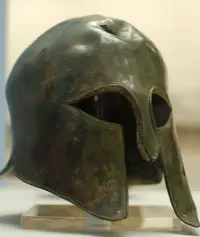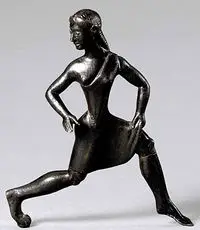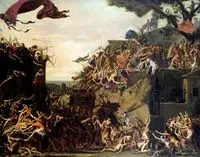What was the role of women in Sparta
Contents
Introduction
Sparta was an ancient Greek city-state whose unique social and political system has fascinated people down the ages. It was a military society, whose warriors are regarded as some of the greatest soldiers of the ancient world. The word Spartan has become synonymous with military prowess and austerity. The battles of Sparta are well-known and have become legendary. However, one aspect of its history may surprise many is the role of women in that society. While the city-state is widely seen as a militaristic and very conservative society it was also a very complex one and women had generally greater freedom than elsewhere in the Greek world. Spartan women will be shown to have played a very important role in society, the economy, culture, and even the state’s politics.
Spartan History
Sparta or Lacedaemon was for centuries one of the most important powers in the Hellenic world. It was located in the south-east of the Peloponnese in modern Greece. Little is known about the early history of the Spartans. Sometime in the 8th century, the Spartans began to reform their social and legal system, because of chronic instability. These reforms are attributed to the semi-legendary Lycurgus and this led to a system which was focused on the army and victory on the battlefield [1]. The focus on the army meant that Sparta was the only Greek state with a professional standing army. Sparta was ruled by two kings, whose power was checked by a council of elders and an assembly of citizens. The individual was expected to subordinate their needs to the collective. One of the most distinctive features of this society was the Agoge, a training program for all young males. It involved young boys being taught military and survival skills. Later when they became citizens and warriors they mainly lived in barracks. Sparta was able to develop such a unique system because it was a slave-owning society. Their ancestors had enslaved the indigenous Messenians, who formed a subjugated population known as helots. All the citizens and their families owned estates that were worked by the helots. The labor of the helots allowed Spartan men to concentrate on being soldiers. By the 6th century, it was recognized as the leading military power and they dominated the Peloponnese. They played a leading role in the defeat of the second Persian invasion (492-490 BC). In the years after the defeat of the Persians, Athens established an Empire. This led to a long war, known as the Peloponnesian War between Sparta and Athens (431-404 BC). The Spartans after receiving support from Persia established a hegemony over Greece until they were defeated at Leuctra by the Thebans and their allies (378 BC). This led to a serious political, social and military decline in the city-state but it managed to maintain its independence from successive Hellenistic monarchs. Rome conquered Sparta in the 2nd century BC and this finally extinguished this most singular state [2].
Sparta women in society
The sources on Sparta women are fragmentary and scarce. Most of the works on Sparta are not the records of Spartan writers and historians but rather of Athenian and other Greek writers [3]. The rest of Greece was fascinated by Spartan females and in particular the unique freedom that they enjoyed. Typically, in the Hellenic world, women were secluded in the home and expected to concentrate on domestic affairs and could not participate in politics and even commerce. Most Athenian women at were not educated, and they lived mostly in the houses of their father and husband and were always under the authority of a male[4] Despite all their radical thinking and cultural achievements, the Greek world repressed women. But according to the sources, Spartan girls were not confined to the home. Unusual, for a Greek city-state, young females received some education. In Greece, there was a great emphasis on physical exercise and it was seen as vital for the development of the young[5]. Spartan girls received some physical training and even trained in athletics with boys and even competed in races and other competitions. As a result of their rigorous physical exercise, it was often held that the Spartan women were the most beautiful in all of Greece. There is also some evidence that suggests that they were taught to sing, dance and also possible to read and write, but this is a subject of controversy [6]. It also appears that these girls had the right to go about in public without a male or female guardian. However, in reality, female Spartans were not as free as presented in the sources and they were still largely controlled by their families. The city-state ’s elite was obsessed with the physical prowess of their population. They were determined to ensure that Sparta had an effective army, and this meant a large number of males who had the required physical prowess. Men were expected to be trained so that they could be great warriors. Women were trained so that they could be mothers, who produced strong and healthy male children for the good of the state [7]. The education and freedom that Spartan girls had was limited and designed to ensure that they provided male children who could be trained as warriors. This meant that they had a definite status in society. Such was the status of motherhood, that those who died in childbirth were honored like those who fell in battle defending the city-state [8].
Spartan Women, marriage and sex
Because the individual was expected to put the common good before his or her own interests the family unit was not strong. Marriage was not about love or even the transfer of property as was the case in the rest of the Hellenic words. As in the rest of Greece, young women in Lacedaemon could not select their bridegroom. However, unlike other city-states, families did not select young women’s husband but an official, performed this role. This was to ensure that Spartan couples could produce strong and healthy male children, for the good of the city-state. [9]. The male Spartan citizen did not live with his wife but in the barracks of Agoge [10] The husband would typically sneak out of the barracks to visit his wife at night. This unusual family life was something that shocked the rest of Greece. The fact that Spartan women were not controlled by their husband or father meant that they had a great degree of freedom. They had more sexual freedom after their marriage and many classical writers assert that Spartan women were routinely unfaithful to their husbands. As a result, the legitimacy of many Spartan male heirs was a matter of controversy[11]. Several Spartan kings were excluded from the throne because of claims that they were illegitimate. In general, the tightly controlled Spartan society was not preoccupied with issues of legitimacy but on the production of male children. Indeed, it is reported that older men encouraged their wives to have affairs with younger men so that out of these relationships, strong male infants would be born. The level of sexual freedom of Spartan women was something that bewildered the Ancient Greeks, including Aristotle. Moreover, Spartan women could divorce their husband which was not the case in the rest of Greece <Cartledge, p 78</ref>.
Spartan Women and Public Life
Spartan women were part of the political community and they had the same rights as men. The city-state’s political system was a curious one and it had two royal families and two queens. Now, these queens did not have real formal political power, but they had enormous influence. The queens had a great deal of social prestige and Gorgo, the widow of King Leonidas, who died a hero at Thermopylae, was a very important figure in Laconia. Many queens used this to influence policies and even royal successions. Perhaps the most influential queen was, Arachidamia, who contributed to the successful defense of the city against Pyrrhus IV in 272 BC [12]. The Spartans were very pious and observant in the worship of the Gods. There were many cults in Sparta dedicated to female gods and heroes. Helen of Troy, who was born in Sparta was worshiped by both women and men. The cults dedicated to female heroes and deities were overseen by priestesses, something that was not uncommon in the Greek world. The number of cults dedicated to female figures indicates the relative importance of women in the city-state. Females played a very important role in the enforcement of Spartan values, especially the family members of warriors. The female relatives of fallen soldiers celebrated the death of those who died in battle and lamented the survival of those adjudged to be cowards. The mothers of warriors had to ensure that their sons fought and died like their forefathers. Reputedly, a Spartan mother told her son ‘to come back with his shield or on it’ [13]. In other words, come back a hero or come back dead. Clearly, women had a great deal of social authority in the city-state unlike other parts of Greece. It was widely believed in the Greek world that women ‘ruled’ the men in the city-state. When a queen was asked why Spartan women were the only in Greece able to dominate men, she replied ‘"because we are also the only ones who give birth to men." [14].
Spartan women and land ownership
Females in the city-state, because their husbands lived in the barracks or were often on campaign ran the household (oikos). They therefore managed not only houses but also estates and oversaw large number of slaves. Therefore, much of the economy was run by women, a situation that was unthinkable in Athens and other Greek city-states. This gave them real power and influence. Critically, unlike in other city-states, they could also inherit land and wealth and married, or widowed women were not controlled by a male authority figure. As men usually died earlier than women, this meant that many widows amassed considerable fortunes [15]. Aristotle claims that many women in Lacedaemon were very rich and lived luxurious lives, despite the traditional austerity of Spartan society. Not only did females become wealthy but they also lent money, and many citizens became indebted to them[16]. Therefore, a class of Spartan woman became extremely wealthy and this led to growing inequality in the citizen body. According to Aristotle this undermined the Spartan system, as women abandoned motherhood to pursue wealth and luxury[17]. This led to a decline in the number of Spartan citizens and a reduction in the size of their army and this led to defeats such as Leuctra. However, it should be noted that Aristotle like many of his contemporaries was influenced by a culture that was misogynistic and distrusted any independent or strong women.
Conclusion
Sparta was a unique society, one which developed a socio-economic and political system that was focused solely on military success. This emphasis on the army meant that a premium was placed on the number of warriors available. As a result, in that society, despite its innate conservatism, women had more rights as they were the mothers of warriors. The role of women as mothers of Spartan citizens made them invaluable and as a result they had a great many more opportunities than Greek women elsewhere, for example they received some education. Then the militaristic nature of Spartan society meant that women had more economic and even sexual freedom. They also were able to play a part in the public affairs of the state and mothers had a particular role in the enforcement of the city-state’s military values. Furthermore, the ability of females to inherit and manage property meant that they became extremely wealthy and how this contributed to the decline of Sparta remains a controversial issue.
Further Reading
Cartledge, Paul The Spartans: an epic history (London, Pan Books, 2013). Powell, Anton "Sparta: A Modern Woman Imagines", The Classical Review, 54 (2) (2004): 465–467, Fleck, Robert K., and F. Andrew Hanssen. "Rulers ruled by women”: an economic analysis of the rise and fall of women’s rights in ancient Sparta." Economics of Governance 10, no. 3 (2009): 221-245. Figueira, Thomas J. "Gynecocracy: how women policed masculine behavior in Archaic and Classical Sparta." Sparta: The Body Politic (2010): 265-296.
References
- ↑ Plutarch, Life of Lycurgus 15. 3-4
- ↑ Cartledge, Paul The Spartans: an epic history (London, Pan Books, 2013), p 203
- ↑ Pomeroy, Sarah. Spartan Women, Oxford: Oxford University Press, 2002), p 11
- ↑ Powell, Anton, Athens, and Sparta: Constructing Greek political and social history from 478 BC (London: Routledge, 2001)
- ↑ Powell, 156
- ↑ Pomeroy, p 117
- ↑ Pomeroy, p 119
- ↑ Pomeroy, p 178
- ↑ Cartledge, p 101
- ↑ Talbert, Richard. Plutarch on Sparta (London: Penguin Books, 2005), p 134
- ↑ Pomeroy, p 119
- ↑ Cartledge, p 201
- ↑ Talbot, p 118
- ↑ Plutarch, Moralia 225A and 240E
- ↑ Pomeroy, p. 167
- ↑ Aristotle, Politics, 1269
- ↑ Aristotle, Politics, 1269


